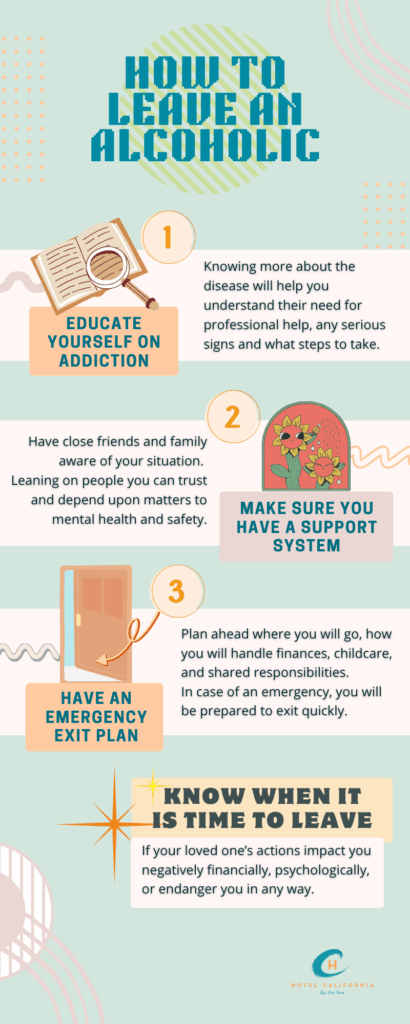How to Leave an Alcoholic
Living with a loved one with alcoholism can impact you emotionally, mentally and physically. Over time, your mental health can suffer, your emotions can feel unstable and you can even become sleep deprived due to the impact of stress and anxiety. Deciding to leave an alcoholic can be a very difficult decision. It is not easy. It is also a process. It is a personal and emotional decision to make.

Walking away doesn’t have to mean you are giving up. There is no shame in wanting to prioritize your well-being, the well-being of your family and wanting a healthier future for yourself and your family. Sometimes, leaving can be the healthiest and most helpful way to support your loved one struggling with alcoholism.
Signs of Alcoholism
What are some of the signs that your partner or loved one may be suffering from alcoholism? They may experience intense cravings or urges to drink alcohol. They begin to lose control when they are drinking or are unable to control how much they drink. They will develop a physical dependence on the drug due to alcohol’s ability to alter brain chemistry.
Your loved one will begin neglecting responsibilities at work or home. They will continue to drink despite repeated negative outcomes. They will spend more and more time drinking and will no longer be engaged with activities they once enjoyed.
Knowing and recognizing the signs that your loved one may have an alcohol addiction can be the first step in prioritizing your health and well-being. Your next steps may lead you to eventually leave that situation in order to maintain your health and safety.

The impact of your loved one’s Alcohol Addiction
Your loved one’s alcohol addiction can significantly impact your life. You may feel stuck with them or sometimes even hopeful that they may change. But either way, alcoholism can cause a lot of stress and lead to many other problems.
- Increased anxiety and depression
- Development of unhealthy coping mechanisms such as turning to substances to manage feelings and emotions
- Difficulty sleeping and experiencing insomnia
- Struggling to meet work and personal responsibilities
- Experiencing trauma
- Redirecting frustrations on other friends, family and loved ones
- Chronic stress about loved ones’ drinking behavior
- Depressed from feeling stuck in a cycle of unpredictability with your loved one
- You experience emotional abuse and lowered self-esteem
- You experience social isolation from withdrawing from friends and family due to alcoholism
- You develop financial stress and worry about money due to you loved one’s alcohol addiction
Check Your Insurance Coverage for FREE
Find out if your insurance covers addiction treatment in minutes. We accept most insurance!
How do you know when it’s time to leave?
- Your loved ones’ drinking habits negatively impact you
- The alcoholic person is showing no signs of slowing down or stopping their drinking behaviors. They may have tried to, but found it too difficult and failed.
- The alcoholic person’s behavior becomes unpredictable and sometimes dangerous. They may take dangerous risks, get into fights, spend money recklessly or say and do hurtful things.
- You constantly feel on edge – You may feel as though you are always walking on eggshells around your alcoholic partner and are constantly having to brace yourself for what might happen next. The unpredictability puts you in a constant state of fight or flight and the stress can take a toll on your health.
- You are unable to take care of yourself and your family – At times, you may feel the weight of the world on your shoulders and always step up to pick up the pieces. It can be easy to lose sight of your own needs when you are trying to support your loved one with alcoholism.
- The loved one is being physically or emotionally abusive – Alcohol abuse often intersects with partner violence. In some cases, alcoholism can intensify violent and controlling behaviors. Bullying, criticizing and blaming you for their behavior are all signs of emotional abuse.
- You feel unsafe or stay out of fear – It’s normal to feel scared about leaving. There are many uncertainties. You may also be concerned for your family’s safety and your own, but you are scared of what may happen if you leave.
- Boundaries have been crossed
- You have lost your trust in your partner
- You are mentally and physically exhausted from the effects of the alcoholic behavior in your relationship
- Your partner or loved one is not willing to acknowledge they have a problem and seek professional help for their addiction
- You are suffering financially due to alcoholism
What to consider before leaving
Before you pack up and physically leave, there are some factors to consider. Where will you go when you leave? How will you handle finances? How will you manage any shared responsibilities, such as childcare for children? Should you stay with a trusted family member or friend?
How to Leave an Alcoholic
Leaving an alcoholic is a very big step. It is not an easy one to make. You cannot blame yourself for your alcoholic loved one’s problems. You cannot take it personally; drug addiction has changed their brain chemistry. You need to know when to take a step back. You need to understand they need professional help.
Make sure you have a support system. Have close friends and family members you can turn to and go to when you need to leave. Having people you can trust and depend on will help you stay focused on making sure you are safe and healthy.
Educate yourself on addiction. Knowing more about the disease will help you understand what you need to do for yourself as well as the alcoholic. Stepping away may be the best option for both parties to get better. Understand that your loved one needs professional help from a behavioral treatment program.
Have an emergency plan. When the signs to leave become more and more apparent, have a plan ready. Leave immediately. You can tell a teacher or counselor at school. You can go to a friend’s house. Or you can escape to a shelter.
Reach out to Hotel California by the Sea
We specialize in treating addiction and other co-occurring disorders, such as PTSD. Our Admissions specialists are available to walk you through the best options for treating your addiction.
Treatment for Alcohol Use Disorder
Alcohol addiction is one of the most common and most damaging mental illnesses. It can change a person’s brain chemistry over time. Living with an alcoholic can cause just as much physical and psychological stress as it does to the person with an alcohol use disorder. In some ways, it is even more difficult to endure. Watching a loved one suffering and knowing there is very limited ways in which you can help them can be heartbreaking. Professional behavioral health treatment programs such as Hotel California by the Sea offer alcohol use disorder treatments.
We offer treatment at all levels of care including detox, residential, PHP and IOP. We utilize evidence-based methods such as CBT, DBT, family therapy and group therapy. Hotel California by the Sea is dedicated to helping clients reach their goals in sobriety and overcome their addiction.
References:
https://www.verywellmind.com/things-to-stop-if-you-love-an-alcoholic-67300
https://www.alcoholhelp.com/blog/living-with-alcoholic
https://fherehab.com/learning/end-releationship-alcoholic
https://www.marriage.com/advice/domestic-violence-and-abuse/when-is-it-time-to-leave-an-alcoholic-spouse/
https://monitoring.bactrack.com/when-to-leave-an-alcoholic/
https://www.rightstep.com/rehab-blog/alcoholic-spouse-when-to-leave/
